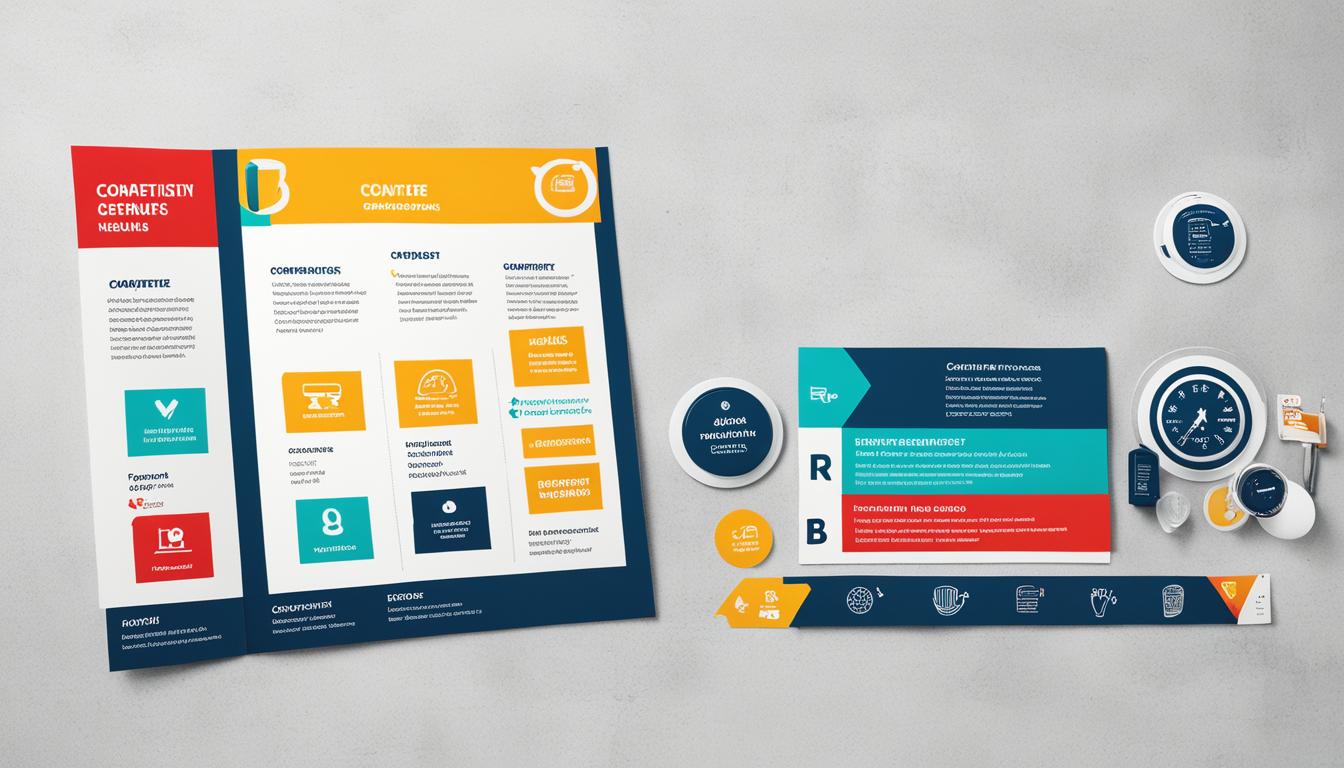Welcome to our in-depth analysis of Deutsche Telekom’s marketing strategy in 2024. As one of the largest integrated telecommunication companies in the world, Deutsche Telekom is at the forefront of digital marketing and brand positioning. In this case study, we will delve into their approach to telecommunications marketing and explore how they are leveraging digital strategies to connect with a global audience and dominate the industry.
Key Takeaways:
- Deutsche Telekom is a leading telecommunications provider with a strong focus on digital marketing and brand positioning.
- Their marketing strategy involves segmentation, targeting, and positioning in the fixed network, wireless, internet, and IT solutions sectors.
- They employ various marketing campaigns, including network expansion and social media marketing, to drive customer engagement.
- Deutsche Telekom’s emphasis on customer engagement and digitalization sets them apart from their competitors.
- Through online advertising, targeted marketing campaigns, and a strong digital presence, they strive to increase brand awareness and reach their target audience.
About Deutsche Telekom
Deutsche Telekom AG, a prominent telecommunications provider in Europe, offers a wide range of products and services. They specialize in fixed-network/broadband services, mobile communications, internet solutions, and IPTV. With a solid presence in the industry, Deutsche Telekom AG has amassed an impressive base of customers.
The company boasts an extensive network, with billions of euros in revenue generated annually. Deutsche Telekom AG serves a massive customer base of 248 million mobile subscribers and provides reliable fixed-network lines to 26 million customers. Additionally, they offer fast and efficient broadband lines to 22 million customers. Such numbers demonstrate the organization’s widespread reach and success in the telecommunications industry.
Deutsche Telekom AG’s commitment to excellence has earned it a place on the esteemed Fortune 500 list. It is partially owned by the German government, further solidifying its stature as a leading telecommunications provider.
| Telecom Services | Number of Subscribers |
|---|---|
| Mobile Communications | 248 million |
| Fixed-Network Lines | 26 million |
| Broadband Lines | 22 million |
Marketing Strategy of Deutsche Telekom
Deutsche Telekom’s marketing strategy is centered around effective segmentation, targeting, and positioning to reach their desired audience. With a wide range of offerings in the fixed network, wireless, internet, and IT solutions sectors, Deutsche Telekom carefully segments their products and services to meet the unique needs of various customer segments.
When it comes to targeting, Deutsche Telekom focuses on servicing Small and Medium Enterprises (SMEs) as well as Multinational Corporations (MNCs). By catering specifically to these customer groups, Deutsche Telekom can tailor their telecommunication services to meet the diverse requirements of businesses operating in different scales and geographical locations.
Deutsche Telekom’s marketing campaigns play a vital role in their overall strategy. These campaigns are designed to raise awareness about network expansion, promote the benefits of 5G technology, and engage customers through social media marketing. By leveraging various social media platforms, Deutsche Telekom ensures that their marketing efforts reach a wide audience and encourage active customer participation.
Moreover, Deutsche Telekom understands the importance of an effective online presence. To improve their visibility and increase organic traffic, they implement SEO strategies to optimize their website for search engines. This approach allows Deutsche Telekom to capture the attention of potential customers who are actively searching for telecommunication solutions.
Example: Deutsche Telekom’s Marketing Campaigns
Deutsche Telekom recently launched a comprehensive marketing campaign highlighting their network expansion. They showcased the benefits of their advanced infrastructure and how it enables faster internet speeds, seamless connectivity, and reliable communication for businesses and individuals alike. Through targeted advertising and engaging content, the campaign successfully positioned Deutsche Telekom as a leader in the telecommunication industry.
This image showcases how Deutsche Telekom leverages social media marketing to connect with their audience and promote their telecommunication services.
Deutsche Telekom’s effective marketing strategy, which encompasses segmentation, targeting, positioning, marketing campaigns, social media marketing, and SEO strategies, has contributed to their success in the telecommunications market. By tailoring their offerings to specific customer segments, effectively reaching their target audience through engaging marketing campaigns, and utilizing digital marketing channels, Deutsche Telekom has positioned itself as a dominant player in the industry.
What’s Unique in the Marketing Strategy of Deutsche Telekom?
Deutsche Telekom’s marketing strategy sets itself apart with a strong emphasis on customer engagement and digitalization. The company understands the importance of building long-term loyalty by connecting with customers on a deeper level.
To achieve this, Deutsche Telekom leverages digital marketing to reach its target audience and enhance its brand image. The company recognizes that the digital landscape is constantly evolving, and they stay ahead by adapting to these changes and leveraging technology in their marketing efforts.
By prioritizing customer engagement, Deutsche Telekom ensures that its marketing campaigns resonate with its audience and foster a strong connection. Through personalized experiences, relevant content, and interactive platforms, the company creates meaningful touchpoints that leave a lasting impression on customers.
Digitalization plays a pivotal role in shaping Deutsche Telekom’s marketing strategy. They understand the transformative power of digital technology and utilize it to optimize their marketing campaigns, gain valuable insights, and drive business growth.
Customer Engagement: A Key Priority
Deutsche Telekom places customer engagement at the forefront of its marketing strategy. By actively listening to customer feedback, understanding their needs, and delivering exceptional experiences, the company aims to build trust and foster long-term loyalty. Through various touchpoints, including social media, customer support channels, and online communities, Deutsche Telekom ensures that customers feel heard, valued, and connected.
Market Segmentation and Competitive Analysis
Deutsche Telekom understands the importance of market segmentation in effectively targeting specific customer needs in the ever-evolving telecommunication industry. By dividing the market into distinct segments based on demographics, behavior, and preferences, they can tailor their products, services, and marketing efforts to meet the unique requirements of each segment.
Through meticulous competitive analysis, Deutsche Telekom gains valuable insights into the competitive landscape, identifying opportunities for differentiation and innovation. This analysis helps them understand their competitors’ strengths and weaknesses, allowing them to refine their own strategies and stay one step ahead in the market.
Customer needs assessment is at the core of Deutsche Telekom’s market segmentation approach. By gaining a deep understanding of customers’ pain points, preferences, and aspirations, they can create compelling solutions that fulfill those needs effectively.
Attracting and retaining top digital talent is another crucial aspect of Deutsche Telekom’s success. To stay competitive in the market, they focus on assembling a team of skilled professionals who possess the expertise and knowledge to navigate the rapidly evolving digital landscape. This emphasis on digital talent empowers Deutsche Telekom to drive innovation, create cutting-edge marketing campaigns, and develop strategies that resonate with their target audience.
Market Segmentation Strategies:
Deutsche Telekom employs various market segmentation strategies to effectively reach and engage their diverse customer base. These strategies include:
- Demographic segmentation: Dividing the market based on age, gender, income, and other demographic factors helps Deutsche Telekom target specific customer groups with tailored offerings.
- Behavioral segmentation: Analyzing customers’ purchase behavior, engagement patterns, and preferences enables Deutsche Telekom to personalize their marketing messages and promotions.
- Psychographic segmentation: Understanding customers’ lifestyles, interests, and values helps Deutsche Telekom create targeted marketing campaigns that resonate with their target audience.
By combining these segmentation strategies with in-depth competitive analysis and a focus on customer needs, Deutsche Telekom maximizes their market presence and solidifies their position as a leading telecommunications provider.
Customer Engagement and Brand Positioning
Customer engagement and brand positioning are key focus areas for Deutsche Telekom. The company understands the importance of creating a seamless customer experience and establishing themselves as industry leaders. To achieve this, they leverage digital marketing and social media platforms to engage with their customers, share relevant content, and build a strong brand presence.
Through effective customer engagement strategies, Deutsche Telekom aims to connect with their audience on a deeper level, fostering long-term loyalty. By understanding customer needs and preferences, they can tailor their offerings and communication to provide a personalized experience. This approach not only strengthens customer relationships but also helps in attracting new customers who resonate with the brand.
Social Media: A Catalyst for Customer Engagement
Social media plays a vital role in Deutsche Telekom’s customer engagement efforts. They utilize popular platforms like Facebook, Twitter, and Instagram to interact with their audience, share updates about their products and services, and address customer queries and concerns in real-time. By actively participating in social conversations and leveraging social listening tools, they gather valuable insights into customer preferences and opinions, which further aids their brand positioning strategies.
Through their social media presence, Deutsche Telekom showcases their commitment to customer satisfaction, responsiveness, and innovation. They creatively use engaging content formats like videos, infographics, and interactive posts to captivate their audience and establish themselves as a go-to source for telecommunications information and solutions.
Moreover, Deutsche Telekom leverages influencer collaborations and user-generated content to strengthen their brand image and connect with their target audience. By partnering with relevant influencers and encouraging customers to share their experiences through hashtags and contests, they create a sense of community and authenticity around their brand.
Building a Strong Brand Positioning
To position themselves as a leader in the telecommunications industry, Deutsche Telekom focuses on building a distinct brand identity that resonates with their target audience. They invest in brand building activities that highlight their core values, vision, and unique value proposition.
Digital marketing plays a significant role in their brand positioning efforts. Through thought leadership content, they establish themselves as industry experts and create credibility among their customers. They share insights, industry trends, and technological advancements to educate and empower their audience.
Additionally, Deutsche Telekom actively engages in corporate social responsibility initiatives and sustainability practices. By showcasing their commitment to social causes and environmental stewardship, they align their brand with values that matter to their audience, thus strengthening their brand positioning further.
The image above represents the significance of brand positioning for Deutsche Telekom. Their strong brand presence, backed by effective customer engagement strategies, enables them to stand out in a competitive telecommunications market.
Online Advertising and Marketing Campaigns
Deutsche Telekom understands the power of online advertising and the impact it can have on their marketing campaigns. They strategically leverage various digital marketing channels to increase brand awareness and reach their target audience effectively.
Through social media platforms, Deutsche Telekom engages with their audience in a meaningful and interactive way. They create compelling content that resonates with their followers, fostering brand loyalty and driving customer engagement.
In addition to social media, Deutsche Telekom utilizes display ads to capture the attention of potential customers. These visually appealing ads are strategically placed across relevant websites and apps, maximizing their visibility and creating brand recall.
Furthermore, search engine marketing plays a crucial role in Deutsche Telekom’s online advertising strategy. By optimizing their website for search engines and running targeted ad campaigns on platforms like Google Ads, they ensure that their brand appears prominently in relevant search results. This enables them to reach customers who are actively searching for telecommunication solutions, increasing their chances of conversion.
Deutsche Telekom’s marketing campaigns focus on showcasing their unique value proposition. They highlight their industry-leading technology, reliable network, and commitment to customer satisfaction. By effectively communicating their brand’s strengths and differentiators, they position themselves as the preferred choice in the telecommunications market.
To further enhance their online advertising efforts, Deutsche Telekom continuously analyzes data and utilizes insights to optimize their campaigns. By closely monitoring key metrics such as click-through rates, conversions, and customer feedback, they can refine their strategies and ensure maximum return on investment.
| Benefits of Online Advertising and Marketing Campaigns | Examples |
|---|---|
|
|
E-commerce Strategies and Mobile Apps
In line with Deutsche Telekom’s commitment to enhancing the quality of their services, they have implemented e-commerce strategies that revolutionize the customer experience. Central to this endeavor is the complete reconstruction of their online store, which now offers a seamless and user-friendly interface.
This online store overhaul aims to address customer pain points, streamline the purchasing process, and ensure that users can swiftly navigate the platform to find the products and services they need. By optimizing the online store, Deutsche Telekom has significantly improved customer satisfaction and loyalty.
Furthermore, Deutsche Telekom understands the growing importance of mobile devices in today’s digital landscape. To cater to mobile-savvy customers, they have developed cutting-edge mobile apps, such as the Mobile Device Management (MDM) app. This app allows users to efficiently manage their work resources, including emails, documents, and collaboration tools, all from their mobile devices.
The MDM app not only provides convenience and flexibility but also enhances productivity for Deutsche Telekom’s customers. By enabling seamless access to work-related resources on mobile devices, the MDM app empowers individuals and businesses to stay connected and productive, regardless of their physical location.
With the integration of e-commerce strategies and the development of innovative mobile apps, Deutsche Telekom continues to push the boundaries of customer-centricity and technological advancements in the telecommunications industry.
| Key Features | Benefits |
|---|---|
| Rebuilt online store | Improved customer experience and satisfaction |
| Mobile Device Management (MDM) app | Convenient access to work resources on mobile devices |
| Streamlined purchasing process | Enhanced efficiency and ease of use |
Conclusion
Deutsche Telekom has strategically positioned itself as a leader in the telecommunications industry through its innovative marketing approach. By focusing on digitalization, customer engagement, and brand positioning, the company has set itself apart from the competition. Their targeted marketing campaigns, online advertising efforts, and strong digital presence have allowed them to connect with their target audience and shape the future of telecommunications marketing.
Through their adaptability and use of technology, Deutsche Telekom remains at the forefront of digital marketing. They understand the importance of engaging customers in a digital world, and their strategies reflect this. By leveraging digital channels and platforms, they have successfully enhanced their brand image while establishing a strong foothold in the industry.
Deutsche Telekom’s marketing strategy is a testament to their commitment to innovation and growth. As they continue to adapt to the changing landscape of the telecommunications industry, they will undoubtedly remain a dominant force in the market. With a strong focus on digital marketing and telecommunications strategy, Deutsche Telekom is poised for long-term success.







